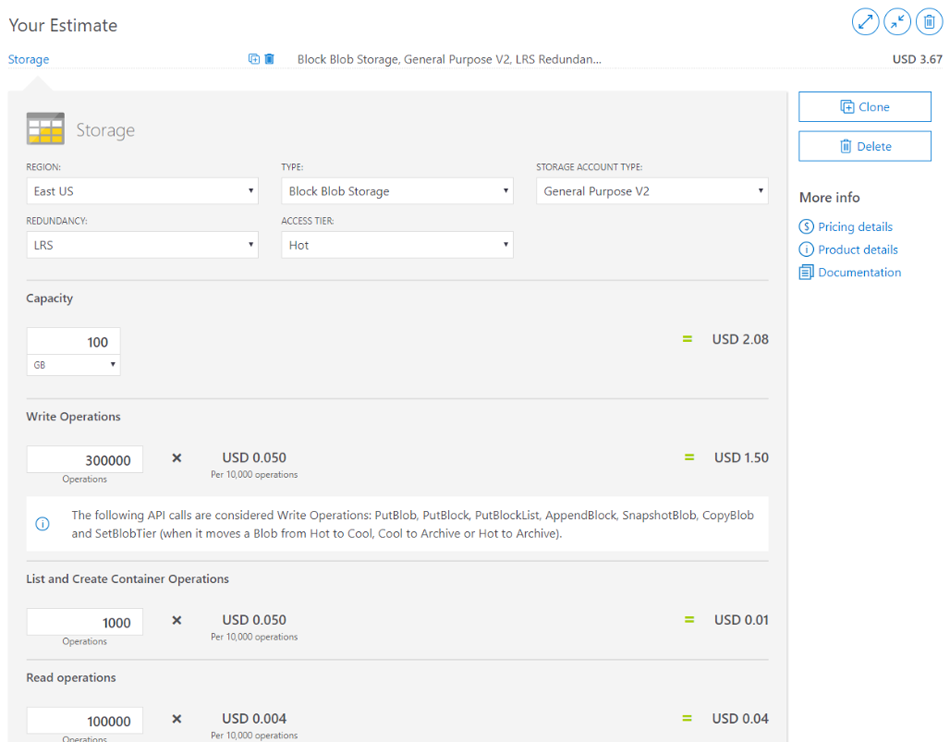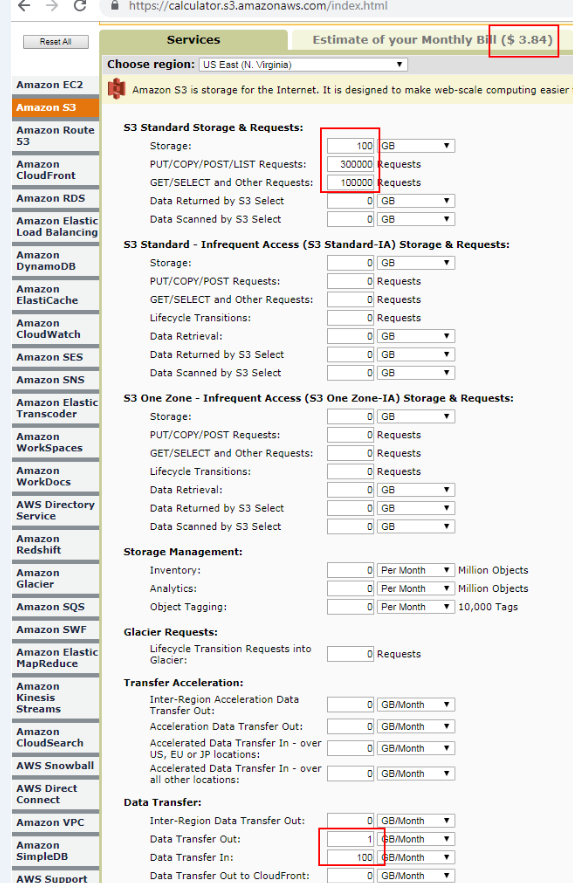When using cloud service providers like AWS and Azure, you may need to estimate how much storage you require for your backups and how much that storage will cost. This resource provides guidance on what values to use in the AWS and Azure storage calculators, what capacity you should plan for and how to estimate the cost.
Storage size estimation
When planning your backup storage capacity, you should consider both the size of the data source that is being backed up to the cloud and the space that will be needed as data is added each time a backup runs, which will depend on the job’s retention scheme. As a guide, for every 100 GB of source data backed up, you should allow for 150 GB of storage.
For example, if you have a data source of 200 GB you should expect to need, over time, 300 GB of storage capacity. This allows for 20 revisions with an average of 5% data change per backup, plus an allowance for space management. These estimates also allow for the fact that deduplication and compression will provide significant space savings.
| Backup's source data | 100 GB | 200 GB | 500 GB | 1 TB | 1.5 TB |
| Cloud storage allowance | 150 GB | 300 GB | 750 GB | 1.5 TB | 2.25 TB |
Storage cost estimation
Azure and AWS each provide a calculator to estimate the cost of your cloud storage. The cost of storage is based on many factors including the storage used, accessing that storage and transferring data to and from that storage. To help, we have provided the following guidelines for both Azure and AWS to help work out the cost of running 1 x 100 GB backup in the cloud. You can use these values to work out the costs of larger backups. For example, if you have 200 GB backed up in storage, just multiply the Storage cost estimation values shown in each section below by 2.
Note: The data transfer component of the cost will be high for the first full backup, then drop dramatically as incremental backups follow and only data that has changed is transferred.
Estimating cloud storage for Azure
The Azure cost calculator is located at https://azure.microsoft.com/en-us/pricing/calculator/
The first step when using the Azure calculator is to select Storage, before scrolling down to view the options. The selections you make should be based on the storage account setup and the container setup.
Calculator options:
- Region - This is the region that the cloud storage is configured for when it is set up.
- Type - Select Block blob storage.
- Storage account type – Select general purpose v2 (or whatever the latest version is).
- Redundancy – LRS is cheapest (i.e. all within the same data center). It gets more expensive as you move down the list.
- Access tier (Hot or Cool) - We recommend Hot but Cool can also be used. Cool storage is less expensive than Hot, but Cool operations are more expensive.

Storage cost estimation
For every 100 GB of storage capacity in the cloud, we estimate that you will need roughly:
- 300,000 write operations.
- 1,000 list and create container operations.
- 100,000 read operations.
- 100,000 for All other operations.
- 1 (GB) for Data retrieval.
- 100 (GB) for Data Write.
Note: If you switch the Redundancy type (from LRS), enter the same amount under Geo-replication data transfer as with Capacity – this makes an assumption that the same data that is being stored is transferred out for Geo redundancy.
Estimating cloud storage for AWS
The Amazon Web services calculator is located at https://calculator.s3.amazonaws.com/index.html
When using the calculator, the first step is to select Amazon S3 from the list of storage types on the left menu. Then use the Choose region drop-down box to select the region that is configured for that container in BackupAssist's Set up destination screen.
The storage cost estimations below are based on the AWS calculator's S3 standard storage & requests category. To learn about the other categories you can use, see https://aws.amazon.com/s3/storage-classes/

Storage cost estimation
For every 100 GB of storage capacity in the cloud, we estimate that you will need roughly:
- 300,000 put/copy/post/list requests
- 100,000 get/select and other requests
- 1 GB/Month Data Transfer Out.
- 100 GB/Month Data transfer in
Note: You will need to change the Data transfer values used to Inter-Region Data Transfer Out if data is transferred between AWS regions. To learn more see https://aws.amazon.com/s3/pricing/
Considerations
You also pay data transfer costs when performing restores, which are harder to budget for.
BackupAssist uses deduplication and compression to reduce the data transfer and storage requirements, however, the efficiencies gained depend on how well the data can be compressed and how much data is duplicated in the source files.